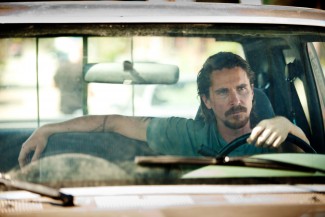‘Out of the Furnace’ can be simultaneously gripping, frustrating

Out of the Furnace, the new movie from writer-director Scott Cooper, features towering performances from three awesome actors: Woody Harrelson, Christian Bale and Casey Affleck. Bale and Affleck play brothers trying to endure difficult circumstances. Harrelson is the wedge between their relationship, and he’s one enormous, violent wedge.
Russell (Bale) works at a local steel mill and tries to keep his life in order. The love of his life is Lena (Zoe Saldana), and he still takes care of his ailing father (Bingo O’Malley). Russell’s uncle (Sam Shepard) stops by in a pickup truck, and everything seems rustic and peaceful in this forgotten Pennsylvania town. Even though Russell has created an enjoyable life, the local landscape is in need of a heartbeat. Businesses are closing up, and troubled young men are being shipped off to Iraq. That’s where Russell’s brother, Rodney (Affleck), has been, and he has the emotional battle scars to prove it.
Coming back from a tour of duty overseas and refusing to work at the mill, Rodney tries to make some extra dough by fighting in underground battles. The crime syndicate that runs these fights is ruthless and competitive. Harrelson plays Harlan DeGroat, perhaps the meanest of the criminals who profit on the bloodletting. He’s the type of character whose energy seems chemically super-induced. Harrelson plays him with frenetic craziness, refusing to calm down, refusing to take no for an answer.
It doesn’t take long for Rodney to go missing after a fight doesn’t go Harlan’s way, and it’s up to Russell to track him down in the netherworld of this drug-and-boxing business.
The positives of the movie are numerous. The acting is uniformly excellent. Bale plays Russell as a quiet, ponderous man, someone who seems worthy of breaking out of the orbit of this rough-and-tumbles neighborhood. His love of Lena is real, and his love of Rodney is pure. Bale plays him with the right balance of maturity and common sense, someone whose been there and tried that, and would like to stay away for the rest of his life.
Affleck is pent-up anger personified, a symbol for the lost wartime youth of the new century. Even the supporting actors, from Shepard to Saldana, are excellent, letting the audience believe in their current allotment in life.
The problem, and it’s a biggie, is that there’s an unfair stereotype that permeates much of the movie’s plot. Almost every character has a dark side, whether it be drug use, violence or some other felonious action. Forest Whitaker’s police chief role seems out of place because the movie obviously doesn’t draw a strong connection between its characters and the consequences of their actions. Law-abiding citizens these are not, and the police presence seems like a useless addition to the narrative.
People in small towns, especially small factory towns that seem devastated in the wake of America’s urbanization, are never accurately portrayed by Hollywood. The landscape begins and ends with crime, and that’s about the depth of it all.
Listen to some of the lines in the movie, and it’ll become obvious that there’s a general fear of what happens “in the woods,” “in the mountains,” “in the country,” “in other states.” This fear of small-town America, and the stereotypical view of northern New Jersey, seems false and somewhat mean-spirited. A few more breaks from the bleakness could have elevated Out of the Furnace to a wonderful, memorable film, perhaps even an award winner. As it stands, the narrative is populated by interesting characters who are enlivened by superb actors, but they are living in a world that places unapologetic dystopia on top of today’s society. There’s some dystopia to highlight, for sure, but calling the rural areas of the Northeast, in particular the regions between Pennsylvania and New Jersey, a large expanse of nothingness, drugs and outlawry, akin to the Wild Wild West, is dead wrong from an accuracy point of view and can be easily taken the wrong way.
Besides these philosophical arguments, Out of the Furnace is enjoyable and gripping. Despite the obvious criticism over its shortsighted view of the world, Cooper’s movie moves through a wonderfully transfixing narrative. But the difference between this movie and the far superlative The Place Beyond the Pines comes down to love and hate. Furnace seems to hate everything about life, while Pines tries to find the beauty in life — even if both movies end tragically.
I’m a fan of Out of the Furnace, but with deep reservations about this slippery slope into obvious generalizations.
By John Soltes / Publisher / John@HollywoodSoapbox.com
-
Out of the Furnace
-
2013
-
Directed by Scott Cooper
-
Written by Cooper and Brad Ingelsby
-
Starring Christian Bale, Casey Affleck, Woody Harrelson, Zoe Saldana, Sam Shepard, Forest Whitaker and Willem Dafoe
-
Running time: 115 minutes
-
Rated R for strong violence, language and drug content
-
Rating:





